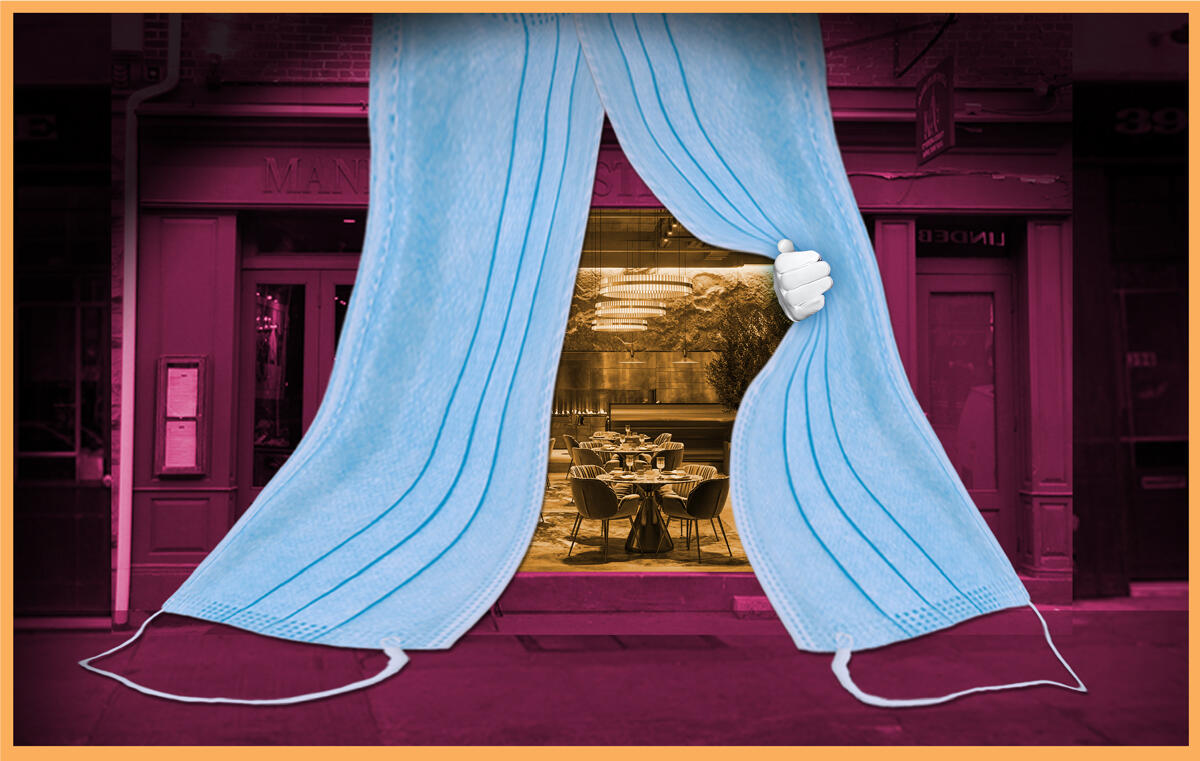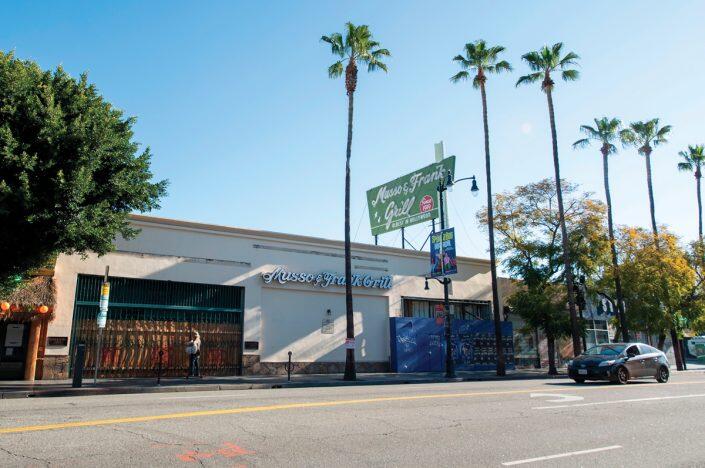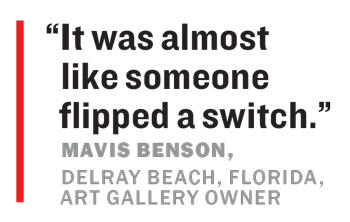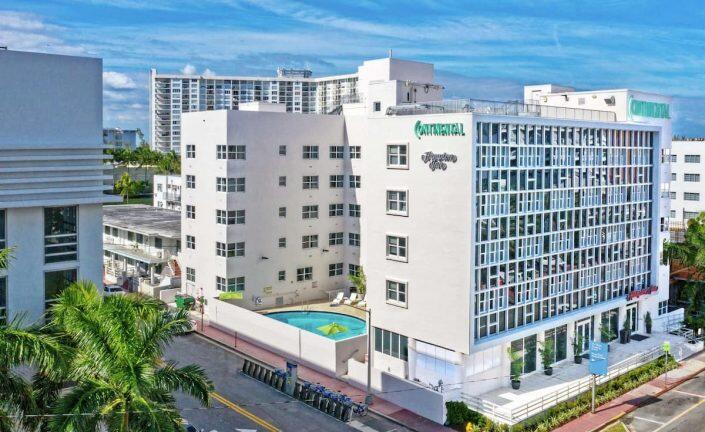Trending
The grand reopening: As restrictions lift, CRE markets race toward recovery
Battered by the pandemic, retailers, restaurateurs and hoteliers express optimism — with a heavy dose of uncertainty

It wasn’t the pan-roasted halibut that drew a small crowd to Blu Mar on a recent Thursday afternoon.
One after another, guests on the splashy Southampton seafood spot’s outdoor patio removed the face coverings they had been wearing for the better part of a year and tossed them into a fire pit, which was then doused with fuel and set ablaze to the tune of “Disco Inferno” by the Trammps.
The gathering — convened just days after the CDC issued new guidelines that said vaccinated individuals could go maskless — wasn’t a protest so much as a celebration.
“The message was clear: Everyone must get vaccinated,” said Zach Erdem, owner of Blu Mar, which briefly had its liquor license pulled last summer over alleged violations of the state’s mask mandate, among other things.
With more than 138 million Americans fully vaccinated as of early June, Covid restrictions are quickly being lifted across the country.
In New York, indoor and outdoor capacity limits for most businesses, along with mask mandates for vaccinated people, were lifted May 19. California businesses will be free from capacity restraints on June 15. And though much of Florida had been open for business for months, Gov. Ron DeSantis suspended all remaining restrictions with an executive order on May 3, two weeks before the CDC’s updated guidance.
While these orders afford business operators significant leeway over just how stringent or lax they want to be — in some cases, a level of ambiguity that has risen to confusion — retailers, hoteliers, restaurateurs and office landlords are broadly optimistic about a comeback. Still, major obstacles remain, including a dire shortage of service workers, a sobering outlook for tourism and an unpredictable office market.
Mavis Benson said she saw an immediate influx of visitors to her Avalon Gallery in Delray Beach, Florida, after the CDC’s change in guidelines.
“It was almost like someone flipped a switch,” she said.

Hollywood’s Musso and Frank during the pandemic (Getty Images)
Classic Hollywood eatery Musso and Frank was shut for more than a year during the pandemic. It reopened for dinner on May 6, when Los Angeles County allowed restaurants to expand indoor capacity to 50 percent.
Now it’s preparing to go to full capacity on June 15, and it won’t be requiring masks or asking patrons for proof that they’ve been vaccinated.
To mask or not to mask?
Equinox’s mask requirements are emblematic of the shifting circumstances from state to state. In California, masks are required at all times at the luxury fitness chain, while in New York, those who are vaccinated can go maskless. In Florida, anyone can opt to work out without a mask.
It’s one of the many retailers across the country deciding how to best react to the reopening. The verdicts that businesses come to can be consequential, according to Rachel Kolocotronis of the hospitality consulting firm Elliot Group.
“If this restaurant decides that they want to be a little bit more strict with their mask guidelines, they run the risk of being mistreated by the guests,” Kolocotronis said. “If they want to be more lax with their guidelines, they run the risk of guests not feeling comfortable enough to dine there.”
Three South Florida businesses The Real Deal spoke with said employees are required to wear a mask, but not patrons. Even so, most customers are opting to keep masks on.
“I think wearing masks probably is going to be part of our society for a long time in our future,” said Stephen Bittel, chair of Terranova, which owns retail and restaurant property along Miami Beach’s Lincoln Road and Coral Gables’ Miracle Mile. “People are going to do what they need to do to feel comfortable re-engaging in the communities.”
 In Los Angeles, reopening rules aren’t yet set in stone, and counties in California have the option to impose their own restrictions despite the state’s new guidance, which extends through Oct. 1.
In Los Angeles, reopening rules aren’t yet set in stone, and counties in California have the option to impose their own restrictions despite the state’s new guidance, which extends through Oct. 1.
It’s been “a yo-yo game” in L.A. throughout the pandemic, said Jon Shook, co-owner of Jon & Vinny’s and four other local restaurants. “We’re making day-to-day decisions.”
Shook said he’ll probably make it optional for guests and servers to wear masks. But difficulties finding available workers also make it trickier to reopen at full capacity.
A staffing crunch
Along Delray’s Atlantic Avenue, patrons came back but many employees did not, said Laura Simon, executive director of the Downtown Development Authority.
When businesses temporarily closed during lockdowns, many employees found jobs elsewhere or sought out different lines of work with less risk of exposure to strangers. Others have opted to remain on unemployment benefits, boosted by a $300 weekly supplement from the federal government extended through September.
Restaurants are “opening indoor dining, and then also maintaining their outdoor dining, and [trying] to provide the level of service that their guests are used to,” Kolocotronis said. “We’re seeing quite a bit of concern about how to balance that. Those that are working at these restaurants are working crazy hours and are a lot of times becoming super burned out.”
Inventory is an additional concern, as factory production has not gotten back up to speed to pre-pandemic levels. That has left Megan Mignano, president of three women’s clothing stores in downtown Delray, wondering how much potential the shops are missing out on.
“People are like, ‘I have not been able to do anything for a year. I am going to go all out and get that $400 dress.’ We can’t keep stuff in stock fast enough,” she said.
A tale of two markets
In New York, many retailers have been operating since capacity increased to 50 percent in March. Around the same time, more opportunistic businesses began considering expansion, given the increased vacancies and low rents.
“Every week it gets a little more normal,” said Brandon Singer, the founder of brokerage Retail by MONA.

The Hampton Inn Miami Beach Mid-Beach (Hampton Inn)
Still, deals have primarily occurred in neighborhoods rather than in Midtown, noted Peter Braus, managing principal at commercial brokerage Lee & Associates NYC.
“I’ve been calling it a doughnut hole,” he said.
That doughnut hole has been compounded by the slow return of office workers, along with the lack of tourism. NYC & Company estimated that domestic travel to New York would be back to its 2019 baseline no sooner than 2023. For international travel, it will take until 2025.
Retailers’ struggles may only be surpassed by those of hotels. The American Hotel and Lodging Association predicts that nationwide hotel room revenue will reach $110 billion this year, a significant improvement over last year’s disastrous figures, but still 34 percent lower than 2019.
“It’s not going to be profitable for at least a year,” said Vijay Dandapani, CEO of the Hotel Association of New York City.
Some hotels have pushed ahead with reopening anyway, initiating the process of rehiring staff, cleaning rooms and welcoming guests.
John Fitzpatrick, who operates two hotels in Midtown, reopened his 687 Lexington Avenue location in May after going dark for over a year. Though his other hotel, near Grand Central, has been open throughout the pandemic, it wasn’t uncommon for it to have fewer than 10 rooms occupied at any given time. At one point, that hotel was considered for use as a maternity ward for a local hospital overrun with Covid-19 patients.
“When I compare ourselves to fellow hoteliers down in Miami, getting 600 [guests] a night for rooms and they can just name the price, we here are just fighting for anything we can get,” Fitzpatrick said.
Indeed, the 100-key Hampton Inn Miami Beach Mid-Beach has made a turnaround. Last year, occupancy hovered around 20 percent and the average daily rate was less than $100, said Todd Benson, a principal at the hotel’s owner, Pebb Capital. The hotel was “in the negative” most of last year, unable to cover expenses and debt, he added.
“It was a struggle until February,” he said. Around that time, occupancy crept up to 37 percent and average daily rate to $125. Occupancy bumped up to the mid-70s in March and April and hit 80 percent in May. The average daily rate for that month was close to $200.
Benson is betting on a further swell in tourism once the cruise industry reopens. The CDC approved a Royal Caribbean cruise set to embark on June 26 from Fort Lauderdale to the Caribbean. It will be the first cruise ship with paying customers to depart the U.S. in more than a year.
Smaller businesses are also seeing gains. At Coral Gables’ Fine Line Furniture & Accessories, the change was felt in April and May, scoring 50 percent higher foot traffic in those months compared to earlier in the year, said President Brianna Brown.
“It seems like all the consumers are happy to be out again,” she said. “They want to touch and feel everything. It has become a social thing.”
For South Florida restaurants, business is not only back, but in many cases back stronger than it was before the pandemic.
“Restaurants are exceeding their best years for sales,” said Lyle Stern, president of the Lincoln Road Business Improvement District.
This is good news for Terranova, as all deferred rent for the down months last year has been paid back, Bittel said.
But it hasn’t been all positive for the landlord and its tenants. The Regal Cinemas at Terranova’s Shadowood Square retail complex near Boca Raton is still closed after the movie theater chain shut down nationwide for a second time in October following a brief reopening last August.
A judge ordered Regal to pay $807,118 in rent owed for the location in April.
Bittel said he isn’t worried about losing money on the 45,000-square-foot space, noting that Terranova and Regal are close to striking a deal to reopen. If that doesn’t happen, he said, another theater chain wants to move in.
Still, the record restaurant business has been welcomed by Bittel, who said the pandemic caused the worst economic downturn he has seen in 40 years.
“In April and May of last year we were all shut down and locked down and, as a business owner-operator, terrified of what the future would look like,” he said. The restaurant boom “has positioned 2021 sale levels to exceed those in the pre-pandemic period.”




